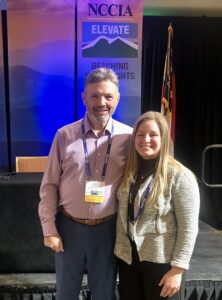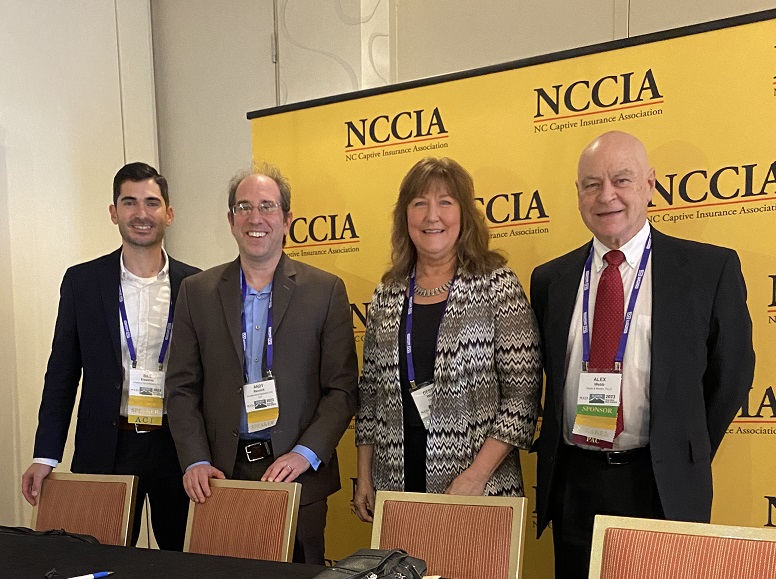By Alyssa Preidt
Our Newest Team Members: Jeff and Alyssa
Jeff and I would like to say that it is our great pleasure to be Capterra Risk’s North Carolina team.

- Jeff Ellington, Senior Vice President, has been in the insurance industry for over 35 years and has a wealth of knowledge and experience. He began working in the captive industry over 11 years ago and has been very active in the industry ever since.
- I, Alyssa Preidt, Underwriting and Claims Manager, have been involved in the insurance industry for 5 years, almost to the day. I received an offer to work for a captive management company right out of college and was so fascinated by the concept of captives that I couldn’t turn it down.
Jeff and I began working together two years ago, also, almost to the day. I’ve had many mentors and leaders in my career to whom I am thankful; but I am constantly humbled by my opportunity to learn from Jeff, an individual who has an incredible amount of knowledge and willingness to pass along his insights to the next generation of insurance professionals like myself.
Update from The North Carolina Captive Insurance Association Conference
The Capterra Team attends numerous conferences every year. One of our favorites is the North Carolina Captive Insurance Association (NCCIA) Conference, which was held this year from May 7th-10th. Afterward, Jeff and I sat down to debrief and share our thoughts on the Conference
NCCIA is a time when captive managers, partners, service providers, and owners come together to support North Carolina as a domicile, learn from other industry professionals, and network with each other to brainstorm solutions for their clients.
The conference begins with an opening ceremony dedicated to highlighting successes and providing updates from the North Carolina Department of Insurance (NCDOI) on the current economic market and how it may be affecting captive performance.
North Carolina is the 6th largest domicile in the world and was launched in 2013
During this opening ceremony, we were fascinated to learn that North Carolina:
- Currently has $1.3 billion dollars of written premium between all licensed North Carolina captives.
- Has quickly grown to become the 4th largest domicile in the United States and 6th largest in the world.
North Carolina first implemented legislation in October 2013 to become a captive domicile and launched its first conference in 2014; the growth North Carolina has experienced in such a short period of time is a testament to all the hard work of the NCDOI.

Founder Sandra Fenters with Mike Causey, the North Carolina Commissioner of Insurance.
Partner Bill Eleamos Participates on Panel
Our very own VP of Finance, Bill Eleamos, presented as a member of a panel on Navigating Conflict Between Owners and Managers.
A few key takeaways from the panel on how to avoid conflict with captive owners and managers and run an efficient captive insurance company were as follows:
- Implement claims procedures with each captive insurance company at inception. Adhere to procedures for reporting, managing, and reimbursement of claims.
- Owners want certainty. Provide consistent and clear communication between the captive manager, insurance regulator, insurer, and insured. Eliminate unknowns/surprises.
- Conduct effective board meetings
 The panel also included Bill Eleamos, Alex Webb, Managing Partner of Webb & Morton, PLLC, Debbie Walker, Consultant, and Andrew Rennick, Partner at Womble Bond Dickinson (US) LLP.
The panel also included Bill Eleamos, Alex Webb, Managing Partner of Webb & Morton, PLLC, Debbie Walker, Consultant, and Andrew Rennick, Partner at Womble Bond Dickinson (US) LLP.
Insights from Other Sessions
A few of the additional sessions that Jeff and I found valuable included:
- The Medical Impact of COVID-19 and Captive Risk Management
- There has been a 70% increase in interest to insure Gap or Medical Stop Loss Insurance in captives due to catastrophic claims, drugs, gene therapy, claim frequency, and size
- 51% of people reported increased captive utilization due to the impact of COVID-19
- Tailor-Made Insurance
- Parametric Insurance is beginning to be used for some weather-related risks, but could have other purposes such as strike, mechanical failure, or civil authority risks
- The claims process can be clearer and more streamlined
- When is an RRG the “Right” Solution
- Risk Retention Groups (RRGs) have proven to be great solution for the following groups: Medical Professional Liability (Physicians, Senior Care), Specialty Auto (Trucking, Livery), and Specialty General Liability (Contractors, Manufacturers)
- RRGs are great if the following factors are present:
- Reinsurance
- Sufficient Levels of Capitalization
- Strong, Core Group of Participants
- Premium Growth/Critical Mass
- Ability to Maintain Lower Expense Ratios
- Strong Relationships with Regulatory Agencies
- Update on Federal and State Tax Issues and Significance of Exposure Units in Analyzing Risk Distribution
- New regulations will be an “upgrade” from Notice 2016-66 and make it obsolete
- New regulations break microcaptives into two categories: “listed transaction” or “transaction of interest”
- The panel believes there are strategic reasons to comment and testify including make the industry’s positions known, and to question the validity of the proposed regulations
- The panel did not recommend submitting a unified, collective opinion piece on behalf of the industry, but did recommend that comments and feedback be sent from various, separate entities with varying opinions and commentary.
- June 12, 2023 is the deadline to submit electronic or written comments on the proposed regulations
In attendance at this year’s Conference, we saw many captive owners. I was thoroughly impressed by captive owners who were eager to learn more about their captive and the captive industry as a whole. We would like to encourage all our clients, especially those domiciled in North Carolina, to consider joining us next year for the NCCIA 2024 conference in Ashville, NC.


